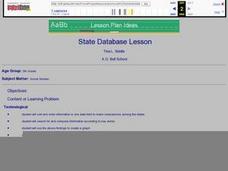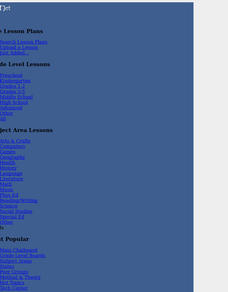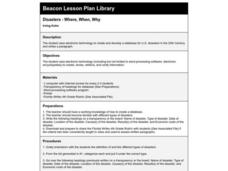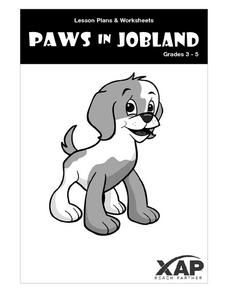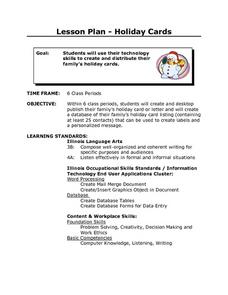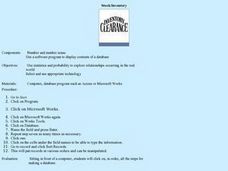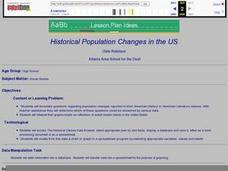Curated OER
States Database Searching and Sorting
Fifth graders search and sort prepared databases for information to use in classroom projects, locate, gather, evaluate, organize, and analyze information.
Curated OER
State Database Lesson
Fifth graders create a database about the geography of the United States. The access to a computer is essential for this lesson. The outcome is that technology is used as a tool to measure student understanding of geographical locations....
Curated OER
Land or Sea?
Sixth graders access a database to search for desired information, using "and" or "or" connectors where necessary. They choose a connector and search a prepared database of European countries to locate which countries border certain...
Curated OER
Designing Databases
Students explore the basic concepts of a relational database by designing a questionnaire to gather information about their school's student body for use in designing more effective school programs.
Teach Engineering
Storing Android Accelerometer Data: App Design
There's an app for that! Pupils learn to build an app that will store data on an Android. The instructional activity introduces class members to the tiny database, TinyDB, for Android devices. A video tutorial provides an...
Curated OER
Creating a Database: Africa, Technology, Social Studies
Students use technology to create a database demonstrating their knowlede (in the case) of the African Continent. This project could be applied to almost any other concept studied.
Curated OER
Disasters - Where, When, Why
Fourth graders research natural disasters that have occurred in the US in the twentieth century. They create computer based database and use the information to write a paragraph.
Curated OER
Paws in Jobland: Role Play
Students think and talk about the world of work. In this career lesson plan, students communicate effectively with other students and work as part of a team to become familiar with database exploration.
Curated OER
Candy Database
Students make a database of their Halloween candy and decide which types are the healthiest. In this diet lesson plan, students make written data charts using their candy, locate dietary information on one type, sort the candy by shape,...
Code.org
Events Unplugged
Introduce event-driven programming. Young computer scientists learn the meaning of event-driven programming and how it is different from previous styles of programming. They play a card game to simulate the challenges that occur in this...
Curated OER
Where in the United States Are We?
Students spend the lesson plan identifying the location of the fifty states and the capitals. Using a software program, they retrace te outline of each state numerous times. To end the lesson plan, they write a story about a state and...
Curated OER
Holiday Cards
Students review basic computer skills needed to create a holiday card along with a database of at least twenty five contacts. They create their family greeting card including graphics, correct spelling an grammar. Using their database...
Curated OER
Stock and Inventory
Young scholars create databases. In this spreadsheet lesson, students take stock of their toys and create databases. Young scholars consider good business practices as they listen to guest speaker discuss how to control inventory.
Curated OER
Famous People
Young scholars create a database with information about famous people. They develop a custom word-processing template. They practice merging fields into their template.
Curated OER
Design Team Challenge
Students work in groups to build a robot. In this robotics lesson, students create an electronic robot and program it to follow directions. They create an obstacle course for the robot to follow and test its performance.
Curated OER
Constructivist Theory
Students in a teacher education program are introduced to the constructivist theory. In grade level teams, they take their subject matter focus and create lesson plans related to the constructivist theory. They are graded with a rubric...
Curated OER
National Marine Sanctuaries Fish
Information is provided on Gray's Reef, Florida Keys, and Flower Garden Banks marine sanctuaries. Young marine biologists then visit the FishBase and REEF databases to collect fish species information for each location. They then...
Curated OER
What information do we want to find out about a real-life millennium superhero?
Fourth graders come up with interview questions for heroes. In this hero lesson, 4th graders discuss what information would be important to include in a report on a superhero. They write their questions in the database program on...
Curated OER
The Electronic Exit Portfolio (EEP)
Here's a fresh take on the student writing portfolio. Consider having learners create an electronic portfolio. After examining sample e-portfolios, class members explore various software programs they will use throughout the course and...
Curated OER
Tree of Life
Students study genetics and evolution. They evaluate a group of organisms and estimate their genetic relatedness. Then they use an online program to check the accuracy of their estimations and make a branching phylogenetic tree which...
Curated OER
Who is the Sea Otter Related to?
Students examine the genetic relationships of different organisms. In groups, they discover the importance of genes and how different amino acids show various evolutionary relationships. They use an online database to continue their...
Curated OER
DatabaseProblem Solving: World Work Organization
Seventh graders use sorting and searching techniques to solve a specific problem using a prepared database.
Curated OER
Technocop
Students explore the role of a police officer while investigating the Microsoft Word program. In this technocop lesson, students examine how to format text using a computer program. Students follow detailed instructions...
Curated OER
Historical Population Changes in the US
Students conduct research on historical population changes in the U.S. They conduct Internet research on the Historical Census Data Browser, create a bar graph and data table using a spreadsheet program, and display and interpret their...

